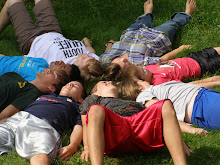BY Mark Shea
"The devil, so the saying goes, is the ape of God. And so one of his standard methods for deceiving is to create parodies of good things and send them into the world in pairs.
Why parodies? Because he cannot make, he can only mock. So instead of love, he offers lust. Instead of justice, he offers merciless vengeance. Instead of dignity, he offers pride. Instead of contentment with the world’s goods, he offers greed.
Why does he send errors into the world in pairs? So that, in fleeing one lie, you will embrace the opposite lie. And so, for instance, he ignores the Church’s ancient affirmation of both faith and reason and instead foments credulity and skepticism, which are to faith and reason as carob is to fine Belgian chocolate.
Halloween is an especially good time for the devil, for it annually introduces into our national conversation a good solid dose of both credulity and skepticism, while encouraging us to overlook both faith and reason.
Credulity encourages us to believe without thinking, and skepticism encourages us to disbelieve without thinking. Both are folly.
The credulous person accepts tales of the supernatural without bothering to find out if they are a) true or b) from God.
The skeptic reflexively rejects the supernatural, not on the basis of the evidence, but on the basis of a personal dogma that rules out the supernatural in advance of and in the teeth of whatever evidence there may be.
Neither approach is the way of the Catholic faith. The Church is open to the reality that God made the world to be orderly and discoverable by reason. This fundamental faith statement is the basis of all the sciences.
Without the basic (and scientifically unprovable) faith that the mind can grasp reality there would be no science.
The dogmatic skeptic who believes that everything you cannot prove with reason should be rejected is sawing off the branch he is sitting on, because you cannot prove with reason that reason is reliable. We take that assumption on faith. A thorough commitment to skepticism means the end, not just of faith, but of reason.
Conversely, the credulous person who sees the miraculous at work everywhere and is ready to declare every water stain on a freeway underpass an apparition of the Blessed Virgin is also acting against both faith and reason.
Credulity will often race ahead of the Church to embrace loony seers and visionaries who announce all manner of non-Catholic rubbish. It will often cower in fear before such seers in anticipation of some terrible divine judgment or demonic spectacle. That kind of credulity is also frequently ready to see demons at work in every head cold or hangnail — with the result that the dogmatic skeptic feels vindicated in sneering at the supernatural.
The Catholic way is wedded to common sense. With respect to credulity, Catholic common sense says, “Chances are the water stain is just a water stain and not a miraculous apparition. Chances are the cold is just a cold and not a manifestation of demonic power.” With respect to dogmatic skepticism, Catholic common sense says, “If a person with nothing to gain and a lot to lose reports seeing a miracle, odds are he is at least being honest. If that honest person’s report of a miracle has solid evidence backing it, then the sensible thing to do is praise God for a miracle.”
So when the apostles and 500 witnesses report seeing the risen Christ and live lives of suffering and martyrdom for it, the most reasonable (and faithful) thing to do is acknowledge that the thing happened. After all, nothing in science or the Catholic faith really makes it impossible since God, under carefully controlled laboratory conditions, can do whatever he likes.
Both faith and reason are grounded in truth: the truth God has revealed about himself, and the truth he has built into creation.
Both credulity and skepticism are grounded in personal prejudice: a person’s will to believe or disbelieve something based, not on the truth, but on one’s own personal preference imposed on the evidence. Both the credulous person and the skeptic are driven to arrive at conclusions that fit their personal prejudices.
The Catholic is free to follow the evidence where it leads and even, when necessary, leave a mystery mysterious.
A Catholic can look at the odd things of this world and say, “I don’t know what it means, so I will think about it and, God willing, form a conclusion based on the evidence.”
The credulous person and the skeptic are committed by their philosophies to not think about it and leap to their conclusions. They must pretend they have knowledge and understanding, when really they only have a prejudice."
(Mark Shea is senior content editor
for CatholicExchange.com.)
Subscribe to:
Post Comments (Atom)






















No comments:
Post a Comment